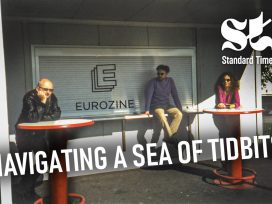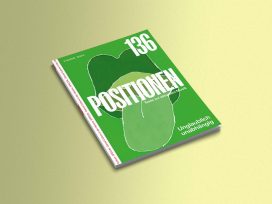Sodobnost has a mixed financing model. We receive 80,000 euros annually from the Slovenian government and around 19,000 euros from subscriptions; because we receive government support we are not allowed to advertise. Next year, because of budgetary restrictions, public funding is likely to be lowered. Nobody knows by how much exactly, but anxiety about radical cuts is widespread and, in my view, justified. The entire annual budget of the Slovenian Book Agency – which supports over 60 literary and scientific periodicals and around 200 books a year, as well as translations into foreign languages and other international promotional activities for Slovenian literature – is currently roughly equal to the cost of building one kilometre of a two-lane motorway, or to the cost of keeping two Slovenian soldiers in Afghanistan (currently there are around 89). The government seems to feel that keeping Slovenian culture alive is less important than flexing our feeble military muscle abroad (“NATO commitments” apparently overriding those towards national culture). On top of this, the government collects far more from the sale of books through VAT (8.5%) than it returns to the Agency and to authors through the Public Lending Right.
Financing European cultural journals
Like other types of cultural organization reliant on public funds, cultural journals throughout Europe have felt the impact of recession. In addition to funding cuts, journals are also having to negotiate the upheavals taking place in the print sector.
Through a European survey of financing for cultural journals, Eurozine takes stock of the situation of the network, in order to communicate its experiences internally and to others who hold a stake in European cultural policy today. [more]
Read the statements here:
Varlik, Turkey
Ord&Bild and Glänta, Sweden
Vikerkaar, Estonia
Wespennest, Austria
Sodobnost, Slovenia
Host, Czech Republic
Res Publica Nowa, Poland
Mute, UK
Intellectum, Greece
Blätter für deutsche und internationale Politik, Germany
Before the creation of the Slovenian Book Agency in 2009, funding for literature came from the Ministry of Culture. The new centre-right governing coalition first decided to abolish the agency, but after a public outcry it decided to keep it going or, rather, let it die by instalments. First it reduced the 2012 budget for book and magazine subsidies by 25 per cent; then it informed the director that salaries for only three employees could be covered, leaving the remaining four to find outside sponsors. This is by far the most original way of running a government agency within the European Union. Because of the cuts, many contracts already signed cannot be honoured, many excellent projects have been cancelled, most have been delayed. Slovenia is fast approaching the level of crisis experienced by Italy, Spain and Portugal. Even greater cuts in the public budget are envisaged for 2013 and 2014, and culture will be the first to suffer.
Funding for Sodobnost is programme-based, lasting three years. After that we have to re-apply. The current three-year period ends this year. There is a possibility that, because of budgetary uncertainty, we will have to apply for funding annually, which would severely limit long-term planning. It would be a catastrophe if we were forced to reduce the number of issues from 12 to 8, or even fewer. Currently, Sodobnost appears regularly and contributors receive their fees within 30 days after publication. If the cuts continue we may be forced to reduce authors’ fees or, alternatively, slim down the volumes (currently we publish around 1650 magazine pages a year). This would be the severest blow to Slovenia’s oldest cultural journal (founded in 1933) since World War II. We live in hope that the long tradition of the journal may at least play some role in future funding decisions.
Sodobnost doesn’t receive any third-party funding from foundations or private donors. Since companies receive no tax benefits for supporting culture, they prefer to sponsor soccer clubs and other sporting activities – understandably enough, since they reach much wider audiences. Nor do we receive any form of “hidden funding”. In order to distribute 650 copies of the magazine to subscribers every month we have to pay normal postal rates; very few copies are sold in the bookshops. Profits from subscriptions from public libraries in Slovenia, as well as the many foreign universities with Slavic departments, cannot be considered a form of hidden funding, either, since an annual subscription only just covers print and publication costs – and that does not include royalties, editorial work and overheads!
We have no full-time employees. Everybody works part time for a modest wage, from the editor-in-chief to the sub-editors to the accountant; staff members have to do other jobs in order to survive. Part of the reason for not employing people full-time is that Sodobnost is published by a non-profit artistic society, a legal entity that enjoys certain benefits in terms of taxes and book-keeping (any profit we make cannot be paid out to the members of the society but must be reinvested in our activities). Of course our annual “profit” rarely exceeds 100 euros. Even so, if we do not reinvest it, it is taxed.
While our new centre-right government is the product of the failure of the previous centre-left government, the latter didn’t single out culture for the most drastic cuts. Relatively speaking, the last few years have been relatively good for the magazine. Government support for the journal was not exorbitant but adequate, allowing us to maintain established standards to a satisfactory degree. After being elected in February 2012, the first thing the new government did was to incorporate the Ministry of Culture into a super-ministry for Science, Education, Higher Education, Culture and Sport! All sectors subsequently received mid-term budgetary cuts, mostly culture, then higher education. The new super-minister is reported to have stated that “culture is important but not that important”. The current government has, for the first time in the history of independent Slovenia, decided that it does not need the support of the country’s fairly numerous and influential cultural community. Nor does it seem to remember that the Slovenian language and nation (as opposed to the 20-year old Slovenian state) has not survived for 14 centuries because of the 89 odd soldiers we now have in Afghanistan (and quite a few, under the banner of the United Nations, in some other trouble spots), but because throughout these centuries it was culture that has been our anchor and saviour.
Of course, the policy changes have to do with the eurozone crisis and the belt-tightening measured imposed by Brussels, compounded by the fact that the new government is at pains to follow the Merkel austerity line to a T. However there are other reasons for why the Slovenian economy (once the most successful economy of the new EU member states) is teetering on the edge of disaster: the unhealthy marriage of politicians and corporate barons, disrespect for the constitutional court, destructive ideological differences going all the way back to World War II, not to mention the pernicious influence of the Catholic Church. All segments of the society are feeling the pinch, culture most of all. Suddenly, within months, culture has been marginalized, even stigmatized. This cannot last of course. Common sense will have to prevail. Slovenia has never been a military power fighting insurgents in faraway lands. We have always been a small nation in the most strategic part of Europe with an enviable national culture, and that has kept us alive.
How are we responding to media change? The Sodobnost website (http://www.sodobnost.com/) includes excerpts from the most interesting contributions in the latest issue (and sometimes in full), introductions to all the books we have published and an archive of past issues of the journal. One can subscribe to the journal via the website and we have an extensive mailing list for regular information and reminders about our publications and activities. The entire contents of Sodobnost all the way back to 1960 are also accessible for free in digital form through the National Library, with the exception of the issues of the running year.
Nevertheless, circulation and sales are declining. Whether that has to do with media change I am not sure. I believe that the main (if not the only) reason for declining circulation is growing economic hardship. Most of our readers are educated middle-class professionals who have been hit hardest by the austerity measures. The same trend is affecting other journals and even daily newspapers. In my opinion, the print journal remains the most relevant form for cultural publishing. At least in Slovenia. At least for the time being. People still love to “handle” books and magazines as physical objects, to see them on their shelves; libraries like to make them available to their visitors in their reading rooms.
The journal’s content follows a 76-year tradition of high quality new poetry, prose and essays; in-depth book and theatre reviews that far surpass those in daily newspapers; new stage plays that publishers generally ignore; socially critical leading articles; introductions to alternative philosophical views and contemporary foreign authors; in-depth interviews with prominent cultural figures. Some people still prefer to have all that in their post-box once a month, rather than navigate the chaos that is the www. Although not averse to it, we feel that exclusively digital future is still some years away – at least from our perspective. This is definitely an area where we don’t strive to be pioneers but are happy to follow in the footsteps of others – when forced to do so. We don’t want to be among those who wish to obliterate the Gutenberg Galaxy; we are happier to be their victims, if it comes to that.
We are broadening our activities by publishing books; this is partly an economic calculation and partly a matter of gaining enough credibility to ensure funding. The books are mostly high quality poetry, novels, short stories, essays and children’s books, both Slovenian as well translations (for the last two years with the support of the European Literature Fund). Regular subscribers can buy the books with up to 40 per cent discount. We have also tried direct political lobbying; however the current decision-makers appear to be deaf. Campaigning too vigorously can even have negative results. What the current government lacks is the readiness to listen, to discuss and to consider arguments – and may the best man win. That is bad for Slovenian culture, and bad for the country.
What role can Eurozine can play in consolidating the position of cultural journals in Europe? For Sodobnost, receiving the rights to publish articles first published by other member journals for free is a definite plus. To make contributions published by our magazine available to other Eurozine partners is another. Without Eurozine partnership we wouldn’t know what is being published elsewhere, and nobody outside Slovenia would know what is being published by Sodobnost. There would be no exchange of ideas, no awareness of the wider context of the current European cultural trends. All things considered, Eurozine is a brilliant idea that should attempt to incorporate as many European cultural journals as possible. I could hardly think of a better way of integrating the various cultures of the European Union, similar though they are. United we stand, divided we fall.






